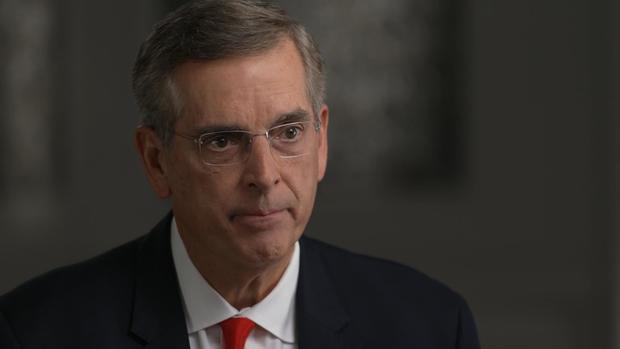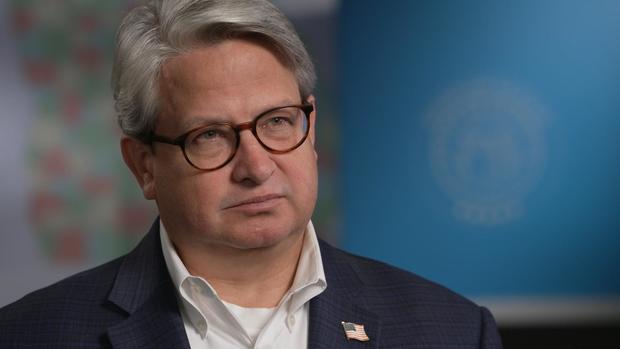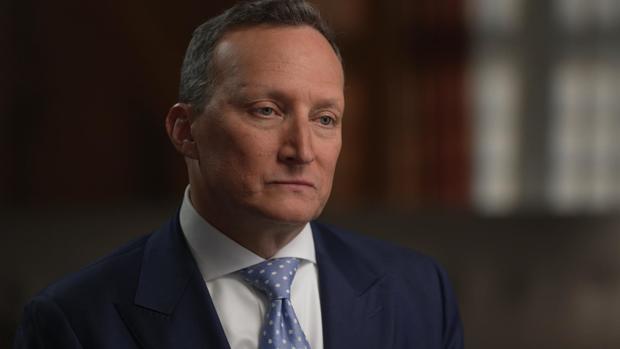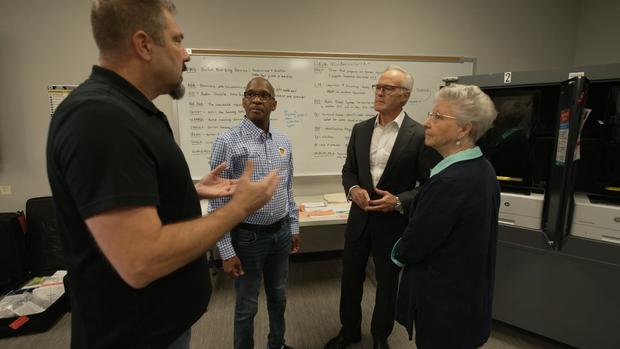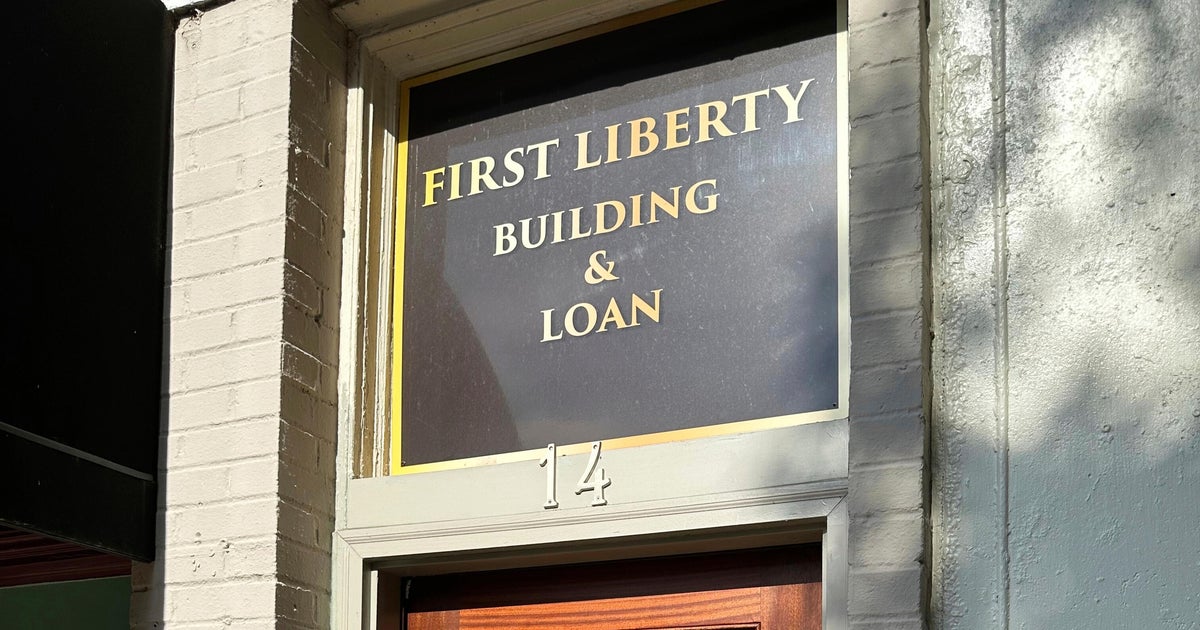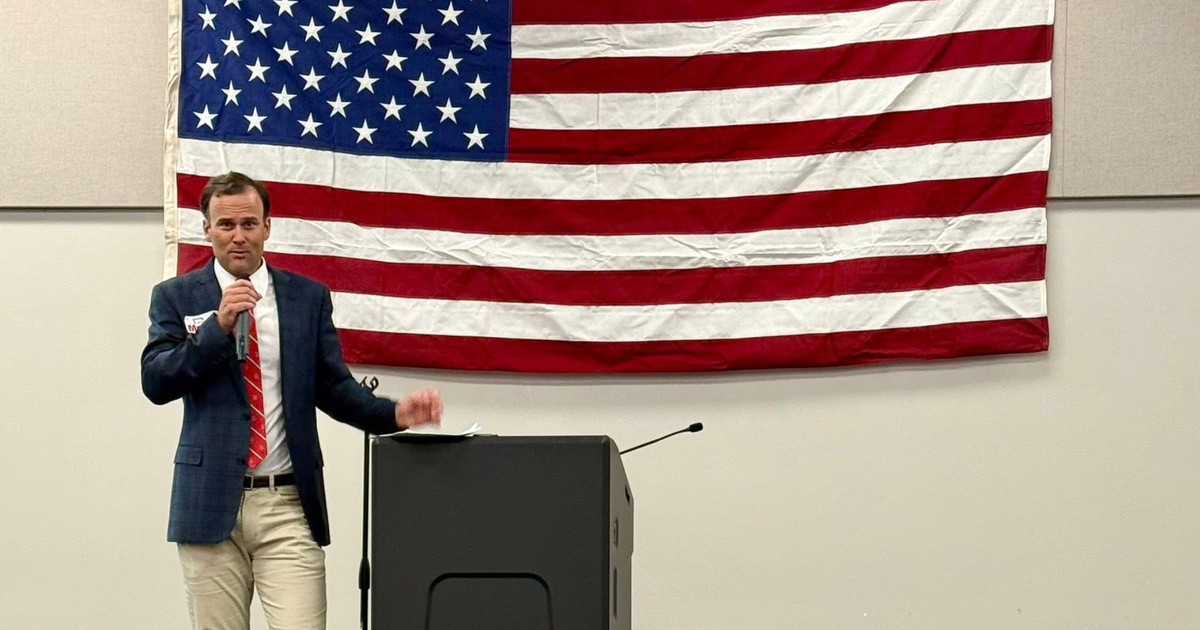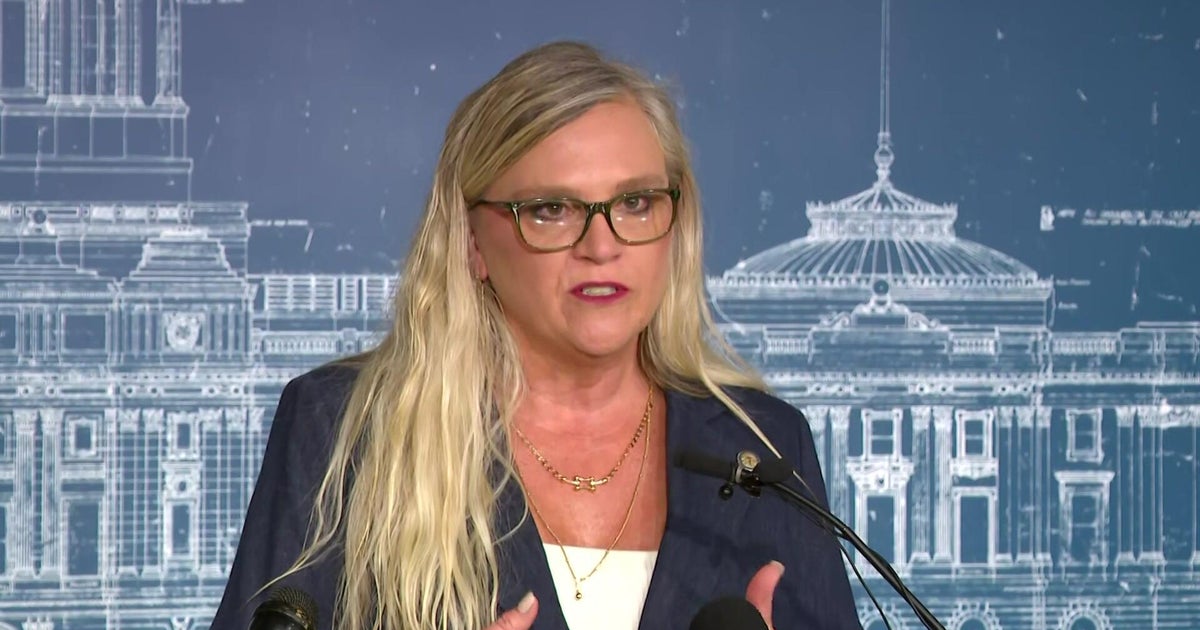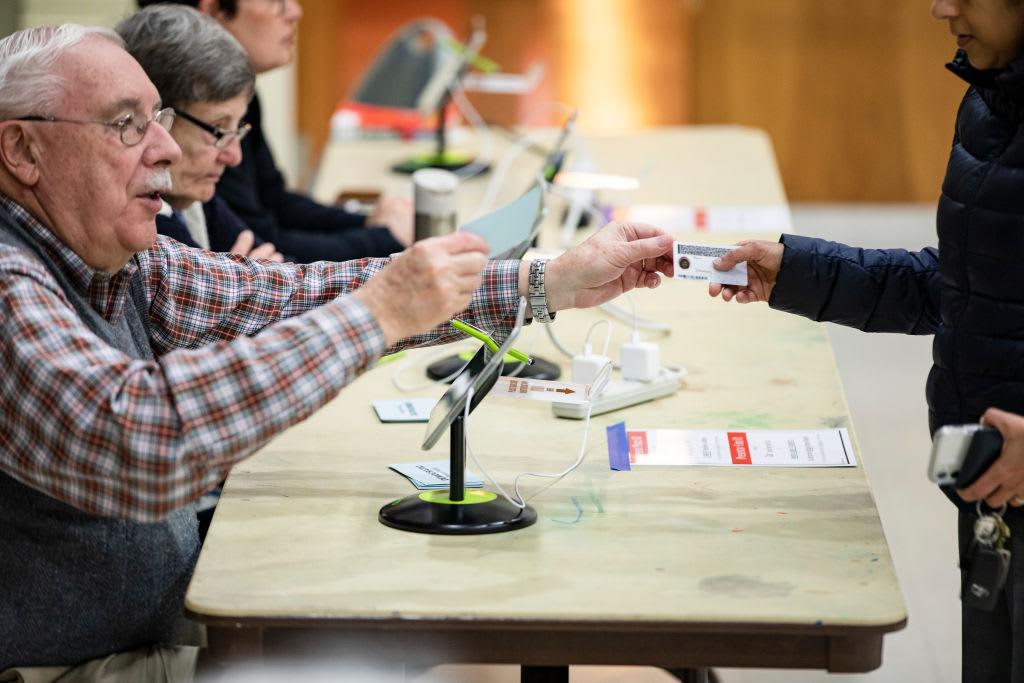Why Georgia election officials say voters can trust the process in 2024
Tuesday, Americans will consider a question more vital than who wins the White House. They'll decide whether they have faith in the ballot. Whether Jan. 6, 2021 was the end of chaos or the beginning. Election fraud lies are aimed at destroying confidence. You're about to hear why they are lies. Gabriel Sterling is a messenger of election truth. He's the Republican chief operating officer for the Georgia secretary of state who runs elections there. Georgia was the center of the scheme to overthrow the 2020 election. Sterling says these are the stakes this Tuesday.
Gabriel Sterling: People have to have faith in the outcomes, and for 200-some-odd years we had to have the acceptance of the person who came in second or lost to say, "You know what? I lost. I will come back again and fight in two years." The reason we have ballots is to avoid bullets. And if you say, "Ballots don't matter anymore," there's only one logical direction to go. And that's not healthy in any democracy.
Scott Pelley: Why should Americans have confidence in this election?
Gabriel Sterling: Every state in this country now has poked and prodded and looked at their processes. And we know that while we all do it slightly differently, everybody assures that there's one person and one vote. Everybody assures that there's a single ballot cast. Nearly every state in the Union now has audits after the fact. Every state in the Union tests their equipment beforehand in a public way. We have tons of people, processes and policies in place in all 50 states and the district to assure that the outcome of the election is correct.
Scott Pelley: And there are millions of people who are skeptical about what you just said.
Gabriel Sterling: There's always some level of skepticism. It's always there but it's reached a different level in the 2020 and 2024 elections.
In the 2020 election, President Trump lost Georgia by a slender 11,779 votes. Two recounts confirmed his loss, but he said this.
Donald Trump (on Nov. 26, 2020): Nobody wants to see the kind of fraud that this election has really come to represent, we are looking at things that are looking at things that are so bad in Georgia.
Four days before the vote was to be certified on January 6th, Trump called Sterling's boss Georgia's Republican secretary of state, Brad Raffensperger.
Donald Trump (on call): So, look, all I want to do is this. I just want to find 11,780 votes, which is one more than we have.
In a state where Republicans controlled every branch of government, Raffensperger stood up to Trump on the call.
Brad Raffensperger (on call): We have to stand by our numbers. We believe our numbers are right.
Trump's lawyers brought shocking tales of fraud to the legislature. But investigations by the state police, FBI and Raffensperger's office found none was true.
Brad Raffensperger: They said there were 66,000 underage voters. There were zero. Then they said that there were 2,423 non-registered voters. There were zero.
Scott Pelley: But you're a Republican. He was your president.
Brad Raffensperger: I work for the people of Georgia. I respond and I work for the voters of Georgia. My job is to run a fair, honest, accurate election.
But fairness and honesty were met with threats of violence.
Gabriel Sterling (during press conference): It has all gone too far.
Death threats to his election workers snapped Republican Gabe Sterling's patience.
Gabriel Sterling (during press conference): It has to stop. Mr. President, you have not condemned these actions or this language. Senators, you have not condemned this language or these actions. This has to stop. We need you to step up and if you are going to take a position of leadership, show some. Stop inspiring people to commit potential acts of violence. Someone's gonna hurt. Someone's going to get shot. Someone's going to get killed.
His warning was five weeks before January 6th.
More than 1,000 rioters have been convicted—just part of the election lie chaos. Trump filed 64 lawsuits and lost 63. Lawyer Rudy Giuliani was sued to bankruptcy after falsely accusing Georgia election workers of fraud. Fox News paid $787 million to settle a suit that said Fox knew it was lying about the election. And Trump was indicted in Georgia. He's pleaded not guilty to election interference but four co-defendants did plead guilty to related charges. Sterling hoped his message would get through to everyone but it hasn't.
- Georgia election officials defend voting system against barrage of false claims, conspiracy theories
Gabriel Sterling: And there's some you're never gonna convince and you just have to accept that you're never gonna convince them. But for the vast majority of Americans who have questions, basically they think, "Well, if there's this much smoke, there must be something. Nobody would lie this much about it." So I think there's savable souls there, who basically they want to understand. We have to tell 'em over and over again, "Voter suppression's fake. Voter fraud is fake. It's used to raise money and get you angry."
Trump riled supporters with election denial from the very first time he was ever on a Republican ballot. He lost the Iowa caucus in 2016 and wrote… "Ted Cruz didn't win Iowa, he stole it." Later, when Trump won the national electoral vote but not the popular vote, he posted "I won the popular vote if you deduct the millions of people who voted illegally." Later, a fraud commission he appointed, disbanded when it couldn't find the evidence.
Scott Pelley: People are gonna say that the election was stolen. It's inevitable.
Gabriel Sterling: Yes, it is.
Scott Pelley: And to them you say what?
Gabriel Sterling: I'm sorry that your candidate lost. But the rules are the rules. The law is the law. And the count is the count.
David Becker: Georgia in many ways is a model. They do a lot of things exceptionally well.
Few people know elections like David Becker. At the Justice Department he helped enforce voting rights. Later, he led the creation of a voter registration data center that is used today by half the states. Becker is a CBS News election consultant.
David Becker: One of the things everyone should understand is the claims about election theft and fraud are not driven by the actual policies that exist in the states. They're driven by one factor, and one factor only. And that's whether your candidate won. Sadly tens of millions of Americans have been targeted for this disinformation. They've been preyed upon by losing candidates and foreign adversaries. And importantly, they have donated money. Because a lot of this is financial. There's a financial incentive for those who've spread the lies, who have raised, let's face it, hundreds of millions, if not billions of dollars off the lie that our elections aren't to be trusted.
Scott Pelley: Let's look at some of the conspiracy theories of fraud. We'll take them one at a time. "Bogus votes are electronically inserted into tabulation machines."
David Becker: They're not connected to the internet. They are under strict physical chain of custody. It is really hard to get access to a physical machine and do anything to it. And even if there were some attempt to hack the machine or, probably more likely, have some kinda malfunction of the machine, the audits would catch it.
Scott Pelley: Another of the conspiracy theories is that illegal immigrants are voting by the millions.
David Becker: That is a 100% false. Every single voter has to give a driver's license number or social security number, which is matched against files, databases that are held to make sure the voter is who they say they are, and they're eligible to vote. And we also know that states who have gone looking for non-citizens voters have found shockingly few even potential non-citizen registrants. Ohio just recently announced that in a period of time of over a decade it had found six possible cases of non-citizens voting.
Scott Pelley: But fraud does happen, doesn't it?
David Becker: It happens very rarely. We know how much fraud in this country happens. We know it's not zero, but it's very, very close to zero.
Scott Pelley: We're not talking about millions of votes or hundreds of thousands of votes?
David Becker: No, we're talking about dozens of votes in a big national election. It is, for all intents and purposes, impossible to steal a big national election. We are so decentralized with almost 10,000 different jurisdictions run by Democratic and Republican election officials. Our voter lists are as accurate as they ever have been before, and they're checked regularly.
David Becker told us the key to confidence in this election, is the paper ballot.
David Becker: Ninety five percent plus of all Americans are gonna vote on paper ballots, which are verifiable and auditable to confirm the count was accurate. And then we audit those ballots, which means we do hand counts of the ballots to compare them to the machine counts, to make sure the machine's got the right result.
Scott Pelley: Why should we trust the people who are working the election?
David Becker: I can tell you I've been workin' with election officials for over a quarter of a century. And when you talk to these election officials out there, Republicans and Democrats, they don't do this because it makes them rich and famous. They do this because it's a calling.
… a calling heard by George Harrison, Beverly Woityra and Paul Petruska, trained poll workers near Atlanta. They told us, when there's a problem it's nearly always a mistake the voter made. And there's a saying at state headquarters, "if you don't know how anything works, everything's a conspiracy."
George Harrison: Sometimes they just want to vent. Sometimes they just wanna have somebody listen to their question and say, "Hey, I have this question. What about this? I try to have all of my voters, by the time they leave, be in a better mood than when they came in.
Election doubters are welcome to volunteer. Like two skeptical women who took the four-hour training course recently.
Beverly Woityra: And they just wanted to see for themselves, and they were both convinced by the time they left training that everything was on the up and up.
Paul Petruska: I would say to the voters who are watching this, stay off the internet. Listen to the people, come down here and talk to us. Fact check with more than Facebook and TikTok. What I would want people to take away from this whole entire conversation, is that gossip, gossip kills.
Gossip isn't the only menace. Many Georgia poll workers have a 911 panic button on a lanyard. Offices are armed with the antidote, Narcan. Last year, Fentanyl was mailed in an attack on election workers just doing their jobs.
David Becker: They want to ensure that all eligible voters, and only eligible voters can vote in a system that is accurate and breeds confidence.
But confidence remains under attack. This post last week claimed illegal Haitian immigrants are voting with Georgia driver's licenses. The FBI traced it to Russia. Election consultant David Becker told us, there'll be more disinformation and a few breakdowns, and mistakes, none of which should be confused with fraud.
Scott Pelley: What should we expect in terms of results on election night?
David Becker: So on Election Night don't expect to know the winner. Definitely don't expect to know who controls the United States House of Representatives. There are a lot of very close races-- even in places like California, that will take days or maybe even weeks to resolve. The Senate we might know a little bit sooner, but unclear. We probably will have a pretty good idea who won the presidency maybe around Thursday or Friday.
That's because the race is essentially tied, including in Georgia where Gabriel Sterling, the Republican secretary of state's chief operating officer, hopes America can endure its next close election without coming apart.
Scott Pelley: What is it like to be the chief operating firewall against lies and myths in the election?
Gabriel Sterling: I've never heard it put to me quite that way. Wild horses couldn't drive me away from this job right now. I mean, I know our system is great in the state. I know the elections across America are safe and secure. I know that 2024 will be the safest and most secure election in history. It will be the most scrutinized election in history. And whoever the winner is, be it Donald Trump or Kamala Harris, we will know that they are the correct winner at the end of the day.
Produced by Henry Schuster and Sarah Turcotte. Broadcast associate, Michelle Karim. Edited by Peter M. Berman.

